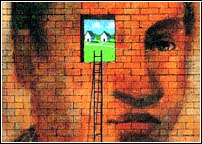|
DAWN The Review, July 27-August 2,
2000
Alternate Reality
In the recent years we have been hearing more than before about psychic dimensions of life. It seems that suddenly there are experts wanting to teach reiki, yoga, meditation, hypnotism and the fourth dimension. Also, there are countless novices willing to learn these disciplines - sometimes at exorbitant prices. Is it all about fantasies and superstition, or do such powers really exist?
It seems that scientists have fewer doubts about the existence of psychic powers than the ordinary person trying to be "scientific."
Societies of psychologists studying telepathy and other psychic experiences are just as old as the modern psychology itself. Freud is said to have encouraged research in this direction and Jung proposed the idea of synchronicity (coincidences happening in an uncanny sequence) long before James Redfield put it down in The Celestine Prophecy. Apart from these mainstream fathers of modern psychology, we had several smaller names and institutions associated with researches into mesmerism, out-of-body experiences, and alternative realities. "Ask Jeeves" on the Internet about it and you would be surprised at the number of impressive academic references that turn up on your screen. However, much of this work was carried out in rather too scientific a manner.
There was too much emphasis on proving or disproving and analyzing. The result of the famous Rhine experiments on ESP and telepathy was a complicated arithmetical data to show the percentage of telepathic occurrences during the experiments. And yet, they made little difference in people's views about extrasensory experiences.
Those who had believed in psychic energies went on believing, while those who hadn't, could not find any convincing argument there. Perhaps it was a wrong approach altogether. Psychic dimension, or alternative reality, is not an issue to be proven or discarded. It can be lived better than it can be understood. Scientific experiments on this topic simply prove one thing: sometimes living and understanding could be two very different things!
If we bypass the debate of whether such powers exist in reality or not, and whether there is another reality or not, we can focus on other, more interesting questions: why have people always been interested in such powers, and why does that interest seems to have increased recently? Perhaps it would be plausible to trace our attraction to the alternative realities in our deeper need for expansion and growth. "Every branch that grows out is a proof to show us that even the plants are aware of the vast space," says Iqbal.
As humans we want to grow, and we want to discover. The physical world has its own limitations and probably it isn't vast enough to accommodate the entire existence of a human being. What about the part in us that dreams, that remains unchained by the experiences of the body and wanders around into fantasies? The physical world doesn't entertain our imaginative faculties so completely as to stop us from looking elsewhere. As long as humans can dream, they will remain interested in anything that opens a window to newer worlds. Whether those worlds exist or not, is a question that probably cannot be answered to everybody's satisfaction. But then who cares?
It is quite understandable that more people today are willing to listen about the extrasensory phenomena than were twenty years ago. This is what we may call the "computer wave," to borrow a term from Alvin Toffler. Computers are one invention of science that undermine the so-called scientific thinking itself, and trigger the power of imagination like no other invention does. While all other machines are a help to our physical powers the computers are accessories to the minds of their users - an aid to imagination. The Internet itself is an alternative reality, a "virtual universe." The Internet surpasses the limitations of the physical world. A person who can "send" "flowers" to their spouse through a "virtual superstore" is also quite likely to be interested in exploring the possibilities of alternative realities.
|
It seems that scientists have fewer doubts about the existence of psychic powers than the ordinary person trying to be "scientific."
|

